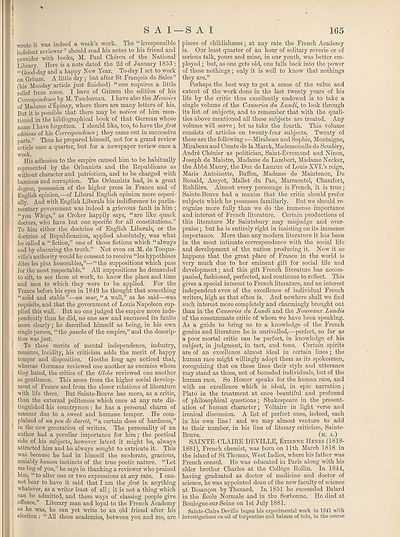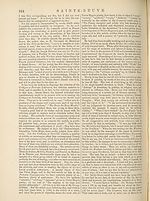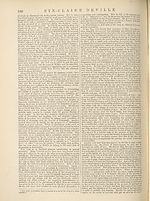Encyclopaedia Britannica > Volume 21, ROT-Siam
(175) Page 165
Download files
Complete book:
Individual page:
Thumbnail gallery: Grid view | List view

! •
S A I-
wrote it was indeed a week’s work. The “ irresponsible
indolent reviewer ” should read his notes to his friend and
provider with books, M. Paul Cheron of the National
Library. Here is a note dated the 2d of January 1853 :
“ Good-day and a happy New Year. To-day I set to work
on Grimm. A little dry; but after St Frangois de Sales”
(his Monday article just finished) “one requires a little
relief from roses. I have of Grimm the edition of his
Correspondence by M. Taschereau. I have also the Memoirs
of Madame d’^pinay, where there are many letters of his.
But it is possible that there may be notices of him men¬
tioned in the bibliographical book of that German whose
name I have forgotten. I should like, too, to have the first
editions of his Correspondence; they came out in successive
parts.” Thus he prepared himself, not for a grand review
article once a quarter, but for a newspaper review once a
week.
His adhesion to the empire caused him to be habitually
represented by the Orleanists and the Republicans as
without character and patriotism, and to be charged with
baseness and corruption. The Orleanists had, in a great
degree, possession of the higher press in France and of
English opinion,—of Liberal English opinion more especi¬
ally. And with English Liberals his indifference to parlia¬
mentary government was indeed a grievous fault in him ;
“you Whigs,” as Croker happily says, “are like quack
doctors, who have but one specific for all constitutions.”
To him either the doctrine of English Liberals, or the
doctrine of Republicanism, applied absolutely, was what
he called a “fiction,” one of those fictions which “always
end by obscuring the truth.” Not even on M. de Tocque-
ville’s authority would he consent to receive “les hypotheses
dites les plus honorables,”—“the suppositions which pass
for the most respectable.” All suppositions he demanded
to sift, to see them at work, to know the place and time
and men to which they were to be applied. For the
France before his eyes in 1849 he thought that something
“solid and stable”—un mur, “a wall,” as he said—was
requisite, and that the government of Louis Napoleon sup¬
plied this wall. But no one judged the empire more inde¬
pendently than he did, no one saw and enounced its faults
more clearly; he described himself as being, in his own
single person, “ the gauche of the empire,” and the descrip¬
tion was just.
To these merits of mental independence, industry,
measure, lucidity, his criticism adds the merit of happy
temper and disposition. Goethe long ago noticed that,
whereas Germans reviewed one another as enemies whom
they hated, the critics of the Globe reviewed one another
as gentlemen. This arose from the higher social develop¬
ment of France and from the closer relations of literature
with life there. But Sainte-Beuve has more, as a critic,
than the external politeness which once at any rate dis¬
tinguished his countrymen : he has a personal charm of
manner due to a sweet and humane temper. He com¬
plained of un peu de durete, “ a certain dose of hardness,”
in the new generation of writers. The personality of an
author had a peculiar importance for him; the poetical
h side of his subjects, however latent it might be, always
attracted him and he always sought to extricate it. This
was because he had in himself the moderate, gracious,
amiably human instincts of the true poetic nature. “Let
me beg of you,” he says in thanking a reviewer who praised
him, “ to alter one or two expressions at any rate. I can¬
not bear to have it said that I am the first in anything
whatever, as a writer least of all; it is not a thing which
can be admitted, and these ways of classing people give
offence.” Literary man and loyal to the French Academy
as he was, he can yet write to an old friend after his
election : “ All these academies, between you and me, are
-S A I 165
pieces of childishness; at any rate the French Academy
is. Our least quarter of an hour of solitary reverie or of
serious talk, yours and mine, in our youth, was better em¬
ployed ; but, as one gets old, one falls back into the power
of these nothings; only it is well to know that nothings
they are.”
Perhaps the best way to get a sense of the value and
extent of the work done in the last twenty years of his
life by the critic thus excellently endowed is to take a
single volume of the Causeries du Lundi, to look through
its list of subjects, and to remember that with the quali¬
ties above mentioned all these subjects are treated. Any
volume will serve; let us take the fourth. This volume
consists of articles on twenty-four subjects. Twenty of
these are the following :—Mirabeau and Sophie, Montaigne,
Mirabeau and Comte de la Marck, Mademoiselle de Scudery,
Andrd Chenier as politician, Saint-l^vremond and Ninon,
Joseph de Maistre, Madame de Lambert, Madame Necker,
the Abb6 Maury, the Due de Lauzun of Louis XYI.’s reign,
Marie Antoinette, Buffon, Madame de Maintenon, De
Bonald, Amyot, Mallet du Pan, Marmontel, Chamfort,
Ruhlifere. Almost every personage is French, it is true;
Sainte-Beuve had a maxim that the critic should prefer
subjects which he possesses familiarly. But we should re¬
cognize more fully than we do the immense importance
and interest of French literature. Certain productions of
this literature Mr Saintsbury may misjudge and over¬
praise ; but he is entirely right in insisting on its immense
importance. More than any modern literature it has been
in the most intimate correspondence with the social life
and development of the nation producing it. Now it so
happens that the great place of France in the world is
very much due to her eminent gift for social life and
development; and this gift French literature has accom¬
panied, fashioned, perfected, and continues to reflect. This
gives a special interest to French literature, and an interest
independent even of the excellence of individual French
writers, high as that often is. And nowhere shall we find
such interest more completely and charmingly brought out
than in the Causeries du Lundi and the Nouveaux Lundis
of the consummate critic of whom we have been speaking.
As a guide to bring us to a knowledge of the French
genius and literature he is unrivalled,—perfect, so far as
a poor mortal critic can be perfect, in knowledge of his
subject, in judgment, in tact, and tone. Certain spirits
are of an excellence almost ideal in certain lines ; the
human race might willingly adopt them as its spokesmen,
recognizing that on these lines their style and utterance
may stand as those, not of bounded individuals, but of the
human race. So Homer speaks for the human race, and
with an excellence winch is ideal, in epic narration;
Plato in the treatment at once beautiful and profound
of philosophical questions; Shakespeare in the present¬
ation of human character; Voltaire in light verse and
ironical discussion. A list of perfect ones, indeed, each
in his own line! and we may almost venture to add
to their number, in his line of literary criticism, Sainte-
Beuve. (m. a.)
SAINTE-CLAIRE DEVILLE, Etienne Henri (1818-
1881), French chemist, wras born on 11th March 1818 in
the island of St Thomas, West Indies, where his father was
French consul. He wns educated in Paris along with his
elder brother Charles at the College Rollin. In 1844,
having graduated as doctor of medicine and doctor of
science, he was appointed dean of the newr faculty of science
at Besangon by Thenard. In 1851 he succeeded Balard
in the l^cole Normale and in the Sorbonne. He died at
Boulogne-sur-Seine on 1st July 1881.
Sainte-Claire Deville began bis experimental work in 1841 with
investigations on oil of turpentine and balsam of tolu, in the course
S A I-
wrote it was indeed a week’s work. The “ irresponsible
indolent reviewer ” should read his notes to his friend and
provider with books, M. Paul Cheron of the National
Library. Here is a note dated the 2d of January 1853 :
“ Good-day and a happy New Year. To-day I set to work
on Grimm. A little dry; but after St Frangois de Sales”
(his Monday article just finished) “one requires a little
relief from roses. I have of Grimm the edition of his
Correspondence by M. Taschereau. I have also the Memoirs
of Madame d’^pinay, where there are many letters of his.
But it is possible that there may be notices of him men¬
tioned in the bibliographical book of that German whose
name I have forgotten. I should like, too, to have the first
editions of his Correspondence; they came out in successive
parts.” Thus he prepared himself, not for a grand review
article once a quarter, but for a newspaper review once a
week.
His adhesion to the empire caused him to be habitually
represented by the Orleanists and the Republicans as
without character and patriotism, and to be charged with
baseness and corruption. The Orleanists had, in a great
degree, possession of the higher press in France and of
English opinion,—of Liberal English opinion more especi¬
ally. And with English Liberals his indifference to parlia¬
mentary government was indeed a grievous fault in him ;
“you Whigs,” as Croker happily says, “are like quack
doctors, who have but one specific for all constitutions.”
To him either the doctrine of English Liberals, or the
doctrine of Republicanism, applied absolutely, was what
he called a “fiction,” one of those fictions which “always
end by obscuring the truth.” Not even on M. de Tocque-
ville’s authority would he consent to receive “les hypotheses
dites les plus honorables,”—“the suppositions which pass
for the most respectable.” All suppositions he demanded
to sift, to see them at work, to know the place and time
and men to which they were to be applied. For the
France before his eyes in 1849 he thought that something
“solid and stable”—un mur, “a wall,” as he said—was
requisite, and that the government of Louis Napoleon sup¬
plied this wall. But no one judged the empire more inde¬
pendently than he did, no one saw and enounced its faults
more clearly; he described himself as being, in his own
single person, “ the gauche of the empire,” and the descrip¬
tion was just.
To these merits of mental independence, industry,
measure, lucidity, his criticism adds the merit of happy
temper and disposition. Goethe long ago noticed that,
whereas Germans reviewed one another as enemies whom
they hated, the critics of the Globe reviewed one another
as gentlemen. This arose from the higher social develop¬
ment of France and from the closer relations of literature
with life there. But Sainte-Beuve has more, as a critic,
than the external politeness which once at any rate dis¬
tinguished his countrymen : he has a personal charm of
manner due to a sweet and humane temper. He com¬
plained of un peu de durete, “ a certain dose of hardness,”
in the new generation of writers. The personality of an
author had a peculiar importance for him; the poetical
h side of his subjects, however latent it might be, always
attracted him and he always sought to extricate it. This
was because he had in himself the moderate, gracious,
amiably human instincts of the true poetic nature. “Let
me beg of you,” he says in thanking a reviewer who praised
him, “ to alter one or two expressions at any rate. I can¬
not bear to have it said that I am the first in anything
whatever, as a writer least of all; it is not a thing which
can be admitted, and these ways of classing people give
offence.” Literary man and loyal to the French Academy
as he was, he can yet write to an old friend after his
election : “ All these academies, between you and me, are
-S A I 165
pieces of childishness; at any rate the French Academy
is. Our least quarter of an hour of solitary reverie or of
serious talk, yours and mine, in our youth, was better em¬
ployed ; but, as one gets old, one falls back into the power
of these nothings; only it is well to know that nothings
they are.”
Perhaps the best way to get a sense of the value and
extent of the work done in the last twenty years of his
life by the critic thus excellently endowed is to take a
single volume of the Causeries du Lundi, to look through
its list of subjects, and to remember that with the quali¬
ties above mentioned all these subjects are treated. Any
volume will serve; let us take the fourth. This volume
consists of articles on twenty-four subjects. Twenty of
these are the following :—Mirabeau and Sophie, Montaigne,
Mirabeau and Comte de la Marck, Mademoiselle de Scudery,
Andrd Chenier as politician, Saint-l^vremond and Ninon,
Joseph de Maistre, Madame de Lambert, Madame Necker,
the Abb6 Maury, the Due de Lauzun of Louis XYI.’s reign,
Marie Antoinette, Buffon, Madame de Maintenon, De
Bonald, Amyot, Mallet du Pan, Marmontel, Chamfort,
Ruhlifere. Almost every personage is French, it is true;
Sainte-Beuve had a maxim that the critic should prefer
subjects which he possesses familiarly. But we should re¬
cognize more fully than we do the immense importance
and interest of French literature. Certain productions of
this literature Mr Saintsbury may misjudge and over¬
praise ; but he is entirely right in insisting on its immense
importance. More than any modern literature it has been
in the most intimate correspondence with the social life
and development of the nation producing it. Now it so
happens that the great place of France in the world is
very much due to her eminent gift for social life and
development; and this gift French literature has accom¬
panied, fashioned, perfected, and continues to reflect. This
gives a special interest to French literature, and an interest
independent even of the excellence of individual French
writers, high as that often is. And nowhere shall we find
such interest more completely and charmingly brought out
than in the Causeries du Lundi and the Nouveaux Lundis
of the consummate critic of whom we have been speaking.
As a guide to bring us to a knowledge of the French
genius and literature he is unrivalled,—perfect, so far as
a poor mortal critic can be perfect, in knowledge of his
subject, in judgment, in tact, and tone. Certain spirits
are of an excellence almost ideal in certain lines ; the
human race might willingly adopt them as its spokesmen,
recognizing that on these lines their style and utterance
may stand as those, not of bounded individuals, but of the
human race. So Homer speaks for the human race, and
with an excellence winch is ideal, in epic narration;
Plato in the treatment at once beautiful and profound
of philosophical questions; Shakespeare in the present¬
ation of human character; Voltaire in light verse and
ironical discussion. A list of perfect ones, indeed, each
in his own line! and we may almost venture to add
to their number, in his line of literary criticism, Sainte-
Beuve. (m. a.)
SAINTE-CLAIRE DEVILLE, Etienne Henri (1818-
1881), French chemist, wras born on 11th March 1818 in
the island of St Thomas, West Indies, where his father was
French consul. He wns educated in Paris along with his
elder brother Charles at the College Rollin. In 1844,
having graduated as doctor of medicine and doctor of
science, he was appointed dean of the newr faculty of science
at Besangon by Thenard. In 1851 he succeeded Balard
in the l^cole Normale and in the Sorbonne. He died at
Boulogne-sur-Seine on 1st July 1881.
Sainte-Claire Deville began bis experimental work in 1841 with
investigations on oil of turpentine and balsam of tolu, in the course
Set display mode to:
![]() Universal Viewer |
Universal Viewer | ![]() Mirador |
Large image | Transcription
Mirador |
Large image | Transcription
Images and transcriptions on this page, including medium image downloads, may be used under the Creative Commons Attribution 4.0 International Licence unless otherwise stated. ![]()
| Encyclopaedia Britannica > Encyclopaedia Britannica > Volume 21, ROT-Siam > (175) Page 165 |
|---|
| Permanent URL | https://digital.nls.uk/193629554 |
|---|
| Attribution and copyright: |
|
|---|---|
| Shelfmark | EB.17 |
|---|---|
| Description | Ten editions of 'Encyclopaedia Britannica', issued from 1768-1903, in 231 volumes. Originally issued in 100 weekly parts (3 volumes) between 1768 and 1771 by publishers: Colin Macfarquhar and Andrew Bell (Edinburgh); editor: William Smellie: engraver: Andrew Bell. Expanded editions in the 19th century featured more volumes and contributions from leading experts in their fields. Managed and published in Edinburgh up to the 9th edition (25 volumes, from 1875-1889); the 10th edition (1902-1903) re-issued the 9th edition, with 11 supplementary volumes. |
|---|---|
| Additional NLS resources: |
|

